Fig. 5 Eph/Ephrin signaling can induce Itgα5 clustering and FN matrix assembly. (A-D) Phosphorylated Epha4 (Epha4-P-Tyr) localizes to somite boundaries and the notochord (n) in wild-type zebrafish embryos (A) but is substantially reduced in epha4 morpholino-injected embryos (B). Ephrin B2a (green) is expressed in a graded fashion in the posterior somites (arrows) of wild-type embryos (C) but is absent in ephrin B2a morpholino-injected embryos (D). Nuclei are red. (E) Epha4-P-Tyr localizes to transient somite boundaries (arrows) in MZ itga5-/- embryos. (F-H) Epha4-P-Tyr blue) colocalizes with ligand-independent Itgα5FYLDDD-GFP clustering (arrows) in MZ itga5-/- embryos. (I,J) Morpholino knockdown of ephrin B2a abolishes ligand-independent Itgα5FYLDD-GFP clustering. (K-M) epha4-expressing clones (red) in a host with no epha4 but with broadly expressed ephrin B2a. Eph/Ephrin signaling can induce a border (K) and Itgα5-GFP clustering (L,M) around the donor clone. Note that Itgα5-GFP in the host cells is largely localized to the border with the clone (arrows), not along the lateral cell cortices. (N) A rosette with polarized host cells surrounding an epha4-expressing clone. Actin fibrils concentrate along the `basal′ surface of the host cells, similar to polarization along somite boundaries. (O,P) FN matrix is assembled around the epha4-expressing clone. (Q-S)A dnepha4-expressing clone (red) induces Itgα5-GFP clustering and FN matrix assembly. C,D,H,M,N,O,S are overlays.
Image
Figure Caption
Figure Data
Acknowledgments
This image is the copyrighted work of the attributed author or publisher, and
ZFIN has permission only to display this image to its users.
Additional permissions should be obtained from the applicable author or publisher of the image.
Full text @ Development

